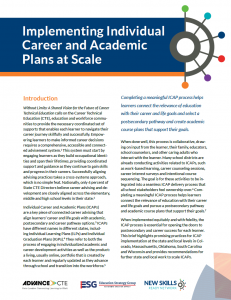The New Skills ready network (NSrn) is part of JPMorgan Chase’s substantial portfolio in support of an inclusive economy and workforce. This five-year commitment is part of the New Skills at Work initiative to prepare people for the future of work and their $30 billion commitment to advance racial equity. With a dedication to building equitable career pathways, the New Skills ready network connects six sites — Boston, Massachusetts; Columbus, Ohio; Dallas, Texas; Denver, Colorado; Indianapolis, Indiana; and Nashville, Tennessee — with local partners with the intentionality necessary to build a strong workforce ecosystem for all learners.
For this highlight blog, Advance CTE Senior Policy Associate Haley Wing met with Erin Jacques, MyCAP District Coordinator, and Marsha Innis-Mitchell, Executive Director of Postsecondary Initiatives for Boston Public Schools to discuss career-connected advising in middle grades. Erin and Marsha are both partners of the New Skills ready network Boston, Massachusetts, project team.
The Boston, Massachusetts project team for the New Skills ready network believes in a city where all young people can engage in high-quality career learning that supports exploration, informed decision-making and preparation for the future. The team aims to dramatically increase the number of Black, Latinx, special education, and English Learner students who participate in and persist through engaging, relevant, and equitable career pathways and are prepared to enter meaningful careers.
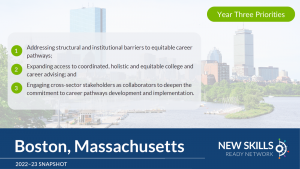
Overview
Over the past three years, the Boston, Massachusetts, project team has been transforming systems to drive equitable education and career outcomes for all learners. The project team has achieved significant milestones in the development of high-quality, equitable career pathways including addressing structural and institutional barriers to equitable career pathways and creating a holistic and seamless advising system to support learners. In year three of the New Skills ready network initiative, the project team prioritized expanding access to coordinated, holistic and equitable college and career advising. The 2022-2023 school year was the first of college and career-connected advising in the middle-grades and project team members from Boston Public Schools shared how they leveraged cross-department collaboration, offered supports to identified priority schools for the rollout and lessons learned throughout the process.
Leveraging Cross-Department Collaboration to Support Expanded Access to Career-Connected Advising
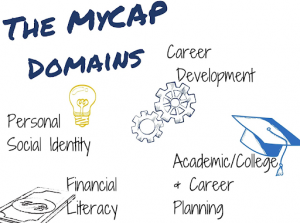 In expanding access to college and career advising, Boston Public School members of the initiative’s project team strengthened their implementation of the My Career and Academic Plan (MyCAP). MyCAP is a learner-centered, multi-year planning tool designed to provide learners with ongoing opportunities to plan for their academic, personal, social and career success. Additionally, because MyCAP is student-centered, there is a large focus on anti-bias and equity to inform, advise and mentor learners. This includes expanding learners’ thinking about what is possible and positioning them to move forward in ways they envision future success.
In expanding access to college and career advising, Boston Public School members of the initiative’s project team strengthened their implementation of the My Career and Academic Plan (MyCAP). MyCAP is a learner-centered, multi-year planning tool designed to provide learners with ongoing opportunities to plan for their academic, personal, social and career success. Additionally, because MyCAP is student-centered, there is a large focus on anti-bias and equity to inform, advise and mentor learners. This includes expanding learners’ thinking about what is possible and positioning them to move forward in ways they envision future success.
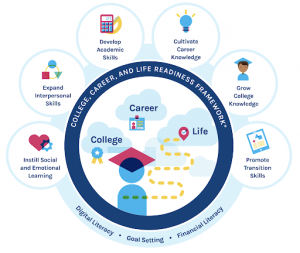 Implementing MyCAP with fidelity across Boston Public Schools requires sustainable and deepened staff capacity at the district’s central office as well as at the school level. Marsha and Erin both support cultivating and maintaining strategic partnerships across the district to align with MyCAP priorities. The collaboration and partnerships during this first year of expanded access to middle-grade learners included leveraging family liaisons who support informing learners and families of opportunities within Boston Public Schools and activating counselor teams that support caseloads of learners in the middle grades. The project team also expanded its reach to include community partnerships that operate in the college and career areas to better serve middle-grade learners. The advantage of bringing these partnerships into the fold allowed greater support for learners with exposure to skills and experiences that support college and career readiness and success (see image).
Implementing MyCAP with fidelity across Boston Public Schools requires sustainable and deepened staff capacity at the district’s central office as well as at the school level. Marsha and Erin both support cultivating and maintaining strategic partnerships across the district to align with MyCAP priorities. The collaboration and partnerships during this first year of expanded access to middle-grade learners included leveraging family liaisons who support informing learners and families of opportunities within Boston Public Schools and activating counselor teams that support caseloads of learners in the middle grades. The project team also expanded its reach to include community partnerships that operate in the college and career areas to better serve middle-grade learners. The advantage of bringing these partnerships into the fold allowed greater support for learners with exposure to skills and experiences that support college and career readiness and success (see image).
To actualize expanded access to MyCAP, the project team identified a cohort of schools with grade configurations in the middle grades (grades 6,7 and 8). The team then worked across departments within the school district to increase the capacity to deliver training, guidance and resources to the identified priority schools. Training for school-level staff includes step-by-step instruction on using the tool and leveraging the accompanying resources to draw connections between learners’ interests and college and career opportunities.
To support schools in their efforts, the district staff recommends schools leverage formalized MyCAP plans that articulate how schools will accomplish MyCAP implementation and the set of experiences they will provide for learners over the course of the school year. Due to the intentionality of the district leadership, plans include support systems like additional counselors pushing in, leveraging collaboration with partners and additional guidance from the district team to support the work.
Impact of Expanded Access to MyCAP
 As a result of the Boston, Massachusetts project team expanding access to high-quality college and career advising through MyCAP, 45% of 7th-grade learners and 42% of 8th-grade learners in the identified priority schools have completed at least one MyCAP task in the first year of expansion. Additionally, the number of district and school-level staff that are being trained on MyCAP continues to increase; in the first year 150 staff were trained and over 200 individuals have been trained as of October 2023. The group of 200 includes staff representing all of the district’s secondary schools and a dozen of lower-elementary schools.
As a result of the Boston, Massachusetts project team expanding access to high-quality college and career advising through MyCAP, 45% of 7th-grade learners and 42% of 8th-grade learners in the identified priority schools have completed at least one MyCAP task in the first year of expansion. Additionally, the number of district and school-level staff that are being trained on MyCAP continues to increase; in the first year 150 staff were trained and over 200 individuals have been trained as of October 2023. The group of 200 includes staff representing all of the district’s secondary schools and a dozen of lower-elementary schools.
The district team and school-level staff are also making greater connections with MyCAP to other bodies of work such as transition planning and special education efforts. MyCAP supports the development and implementation of efforts to support learners’ postsecondary readiness and transitions; these components are also in alignment with Individualized Education Plans (IEPs). Transitional planning is integral to IEPs and MyCAP is transition planning for learners.
Lessons Learned from Launching Expanded Access to MyCAP
Additional capacity building: A key component of the expansion of MyCAP includes additional capacity building. The project team explicitly highlighted that this work is not possible without a district-level staff member dedicated to serving and supporting school-level staff to implement MyCAP. Erin’s role allows the capacity to sit down with school-level staff to increase counselors’ leadership abilities and competencies. As mentioned earlier, the district provides resources to support this work, however, resources and guidance documents are only useful if there is a staff member to support walking through the planning and implementation process.
School counselor involvement is critical: At the school level, school counselors are needed to support the planning, collaboration and implementation of MyCAP. In schools where the expanded access efforts have been implemented, there is a counselor who has built their team within the school, trained their team and teachers, and informed administrators of the planning and implementation process. This is especially important considering scheduling within school buildings and ensuring that MyCAP is integrated into and across advisory blocks within schools.
Adequate training is essential to advocacy: In addition to better serving learners in their career and college planning, the project team has also noted the increased advocacy efforts of counselors within schools that are implementing expanded access to MyCAP. The project team has noticed when school-level counselors are adequately trained and supported, they take ownership of the implementation process and leverage their leadership to mobilize their peers. This can include accurately communicating the vision of MyCAP, identifying how and when it connects to other school-level staff’s work, offering support to leverage MyCAP and advocating for systems within the school that support learners’ postsecondary success. This is especially exciting to witness given there is no mandate to implement or leverage MyCAP in Boston Public Schools, and signals to the district that in the sea of competing priorities, school counselors, administrators and staff are identifying MyCAP as foundational to learners’ transitions to and through college and careers.
Replicating Expanded Access to College and Career Advising
Providing learners access to high-quality college and career advising is a critical component of supporting learners’ transitions, readiness and preparation for the workforce. Leaders who are interested in replicating the efforts of Boston Public Schools should:
-
- Prioritize cross-sector capacity building: identify who in the community can come together to help make the effort a shared responsibility.
- Leverage a relationship-centered approach: build the capacity and system to respond to school-level staff’s needs with grace, flexibility and transparency.
- Center learners and their experiences: focus the work of the initiative to implement systems and processes that are most impactful for learners and their communities.
Looking Ahead
As the project team looks forward, they plan to continue the momentum of expanded access to MyCAP and plan to bring in more schools with earlier grade bands like elementary schools in the district. As MyCAP training and implementation expands, the team continues to have a deep focus on equity, aligning inclusive education goals and activating MyCAP at points of transition within learners’ journey.
To learn more about Individual Career and Academic Plans, read Implementing Individual Career and Academic Plans (ICAP) at Scale in the Learning that Works Resource Center. This brief highlights promising practices for ICAP implementation at the state and local levels in Colorado, Massachusetts, Oklahoma, South Carolina and Wisconsin and provides recommendations for further state and local work to scale ICAPs.
Haley Wing, Senior Policy Associate
Read our other New Skills ready network Highlight Blogs from 2023:
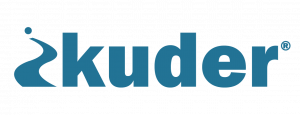



 In expanding access to college and career advising, Boston Public School members of the initiative’s
In expanding access to college and career advising, Boston Public School members of the initiative’s Implementing MyCAP with fidelity across Boston Public Schools requires sustainable and deepened staff capacity at the district’s central office as well as at the school level. Marsha and Erin both support cultivating and maintaining strategic partnerships across the district to align with MyCAP priorities. The collaboration and partnerships during this first year of expanded access to middle-grade learners included leveraging family liaisons who support informing learners and families of opportunities within Boston Public Schools and activating counselor teams that support caseloads of learners in the middle grades. The project team also expanded its reach to include community partnerships that operate in the college and career areas to better serve middle-grade learners. The advantage of bringing these partnerships into the fold allowed greater support for learners with exposure to skills and experiences that support college and career readiness and success (see image).
Implementing MyCAP with fidelity across Boston Public Schools requires sustainable and deepened staff capacity at the district’s central office as well as at the school level. Marsha and Erin both support cultivating and maintaining strategic partnerships across the district to align with MyCAP priorities. The collaboration and partnerships during this first year of expanded access to middle-grade learners included leveraging family liaisons who support informing learners and families of opportunities within Boston Public Schools and activating counselor teams that support caseloads of learners in the middle grades. The project team also expanded its reach to include community partnerships that operate in the college and career areas to better serve middle-grade learners. The advantage of bringing these partnerships into the fold allowed greater support for learners with exposure to skills and experiences that support college and career readiness and success (see image). 
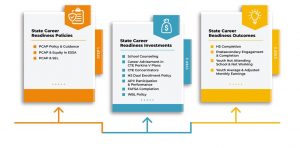 In May, the Coalition for Career Development Center released the first annual
In May, the Coalition for Career Development Center released the first annual 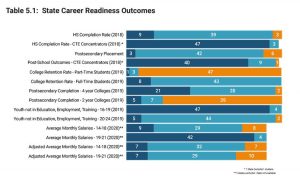 For postsecondary CTE concentrators, the report finds that 40 states are placing 70 percent or more of secondary learners into postsecondary training and education, military or employment after high school graduation. Only three states, however, are placing 70 percent or more of all high school graduates into either a two-year or four-year postsecondary training or education program. The report recommends expanding post-school data points as well as counting military service and employment as post-school outcomes for learners.
For postsecondary CTE concentrators, the report finds that 40 states are placing 70 percent or more of secondary learners into postsecondary training and education, military or employment after high school graduation. Only three states, however, are placing 70 percent or more of all high school graduates into either a two-year or four-year postsecondary training or education program. The report recommends expanding post-school data points as well as counting military service and employment as post-school outcomes for learners.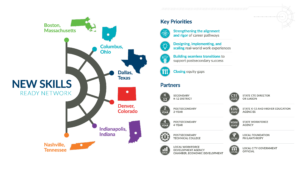
 The Attainment Network envisions an innovative education-to-workforce system that develops a diverse, talented workforce for current and future jobs, meets economic demands and sustains thriving communities. As The Network pursues this vision, their measure of success encompasses key evaluation questions embedded in equitable outcomes for learners. This includes measuring the number of diverse learners completing high-value credentials and receiving opportunities for high-wage, in-demand careers.
The Attainment Network envisions an innovative education-to-workforce system that develops a diverse, talented workforce for current and future jobs, meets economic demands and sustains thriving communities. As The Network pursues this vision, their measure of success encompasses key evaluation questions embedded in equitable outcomes for learners. This includes measuring the number of diverse learners completing high-value credentials and receiving opportunities for high-wage, in-demand careers.
